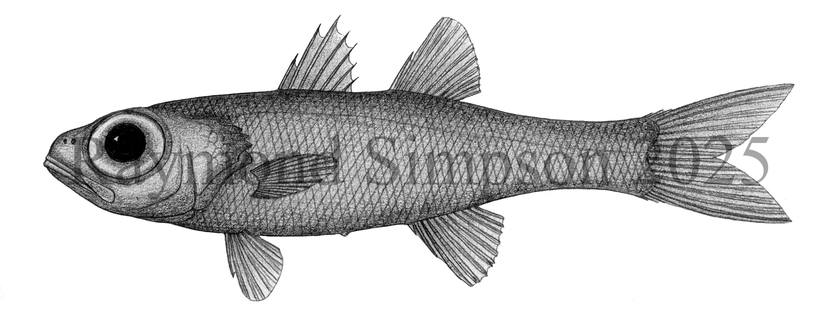
Common Name
Bigeye Deepwater Cardinalfish
Year Described
Goode & Bean, 1881
Identification
Dorsal Fin: VII-VIII-1, 10 (rarely 9 or 11)
Anal Fin: II, 9 (rarely 8 or 10)
Pectoral Fin: 17-19
Lateral Line: 46-49
Gill Rakers: 26-30 (first arch)
Vertebrae: 10+15 = 25 total
Body moderately slender and laterally compressed. Body depth 22.4-29.6% SL. Caudal peduncle length 22-26.3% SL. Large terminal mouth. Teeth conical. Lingual and endopterygoid teeth absent. No enlarged teeth present at lower jaw symphysis. Maxillary process absent. Opercular spine absent. Opercular margin with spinelets. Pyloric caeca 10-13. Ribs present on last abdominal vertebrae. First dorsal spine small (about half length of second). Body scales deciduous and ctenoid. Lateral line complete and composed of pored scales. No luminous organ on belly.
Color
Body grayish-brown on the dorsum with a silvery flank and whitish belly. Fins with dark membranes. Mouth light. Gills area dark. Up to 120mm specimens have black bands around the caudal peduncle.
Size
Maximum size to 194mm SL.
Habitat
Occurs near hard bottoms and walls from 210-600m but usually 300-500m.
Range
Labrador to French Guiana, including the Caribbean Sea and Gulf of Mexico.
References
Mayer, G. F. 1974. A revision of the cardinalfish genus Epigonus (Perciformes, Apogonidae), with descriptions of two new species. Bulletin of the Museum of Comparative Zoology v. 146 (no. 3): 147-203.
Okamoto, M., Baldwin, C. C., & D. J. Long. 2024. Two new species of the deepwater cardinalfish genus Epigonus (Epigonidae) from deep reefs off Curaçao, southern Caribbean. Ichthyological Research, 71(3), 1–10.
Okamoto, M., D. J. Long, R. Claro, & J. E. McCosker. 2025. A new species of epigonid fish genus Epigonus (Teleostei: Epigonidae) from Cuba and the first records of E. fragilis from the western South Pacific and Taiwan. Ichthyological Research, 1-10.
Other Notes
Closest to Epigonus denticulatus, differing in body depth, caudal peduncle length and expression of a dark ring on the caudal peduncle.